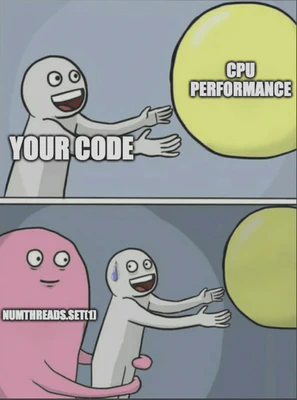numthreads 🧵
🎄🎁 Advent of Open Source – Day 07/24: A simple utility to control thread counts for numerical libraries, preventing performance degradation.

(See my intro post)
Sometimes the smallest tools solve the most persistent problems. Today’s project is about taming automatic parallelization in scientific computing - a deceptively simple challenge that has cost countless CPU hours.
📖 Origin Story
While working on high-performance computing clusters, I frequently encountered a counterintuitive problem: code running slower on multiple CPU cores than on a single one.
Many scientific libraries (NumPy, SciPy) automatically parallelize operations, which sounds great but can actually harm performance when you’re already parallelizing at a higher level.
After repeatedly explaining to colleagues why they needed to set various environment variables to disable this behavior, I created numthreads to solve it once and for all.

🔧 Technical Highlights
- Controls thread count for major numerical libraries:
- OpenBLAS
- Intel’s Math Kernel Library (MKL)
- OpenMP
- NumExpr
- Accelerate
- Zero dependencies
- Tiny (≤7KB) yet solves a real problem
- Both CLI and Python API
📊 Impact
Over my scientific computing career, I’ve encountered this threading issue dozens of times. Since creating this package a year ago, I’ve helped at least 5 different researchers speed up their workflows, sometimes by orders of magnitude. The beauty lies in its simplicity - the fix is often as simple as:
eval $(numthreads 1)
💡 Lessons Learned
- The simplest solutions are often the best
- More cores doesn’t always mean faster code
- If you find yourself repeating the same instructions, write a tool
- Even a 7KB package can save hours of computing time
Want better control over your numerical computations? Check out numthreads on GitHub!
#OpenSource #Python #HPC #ScientificComputing #Programming